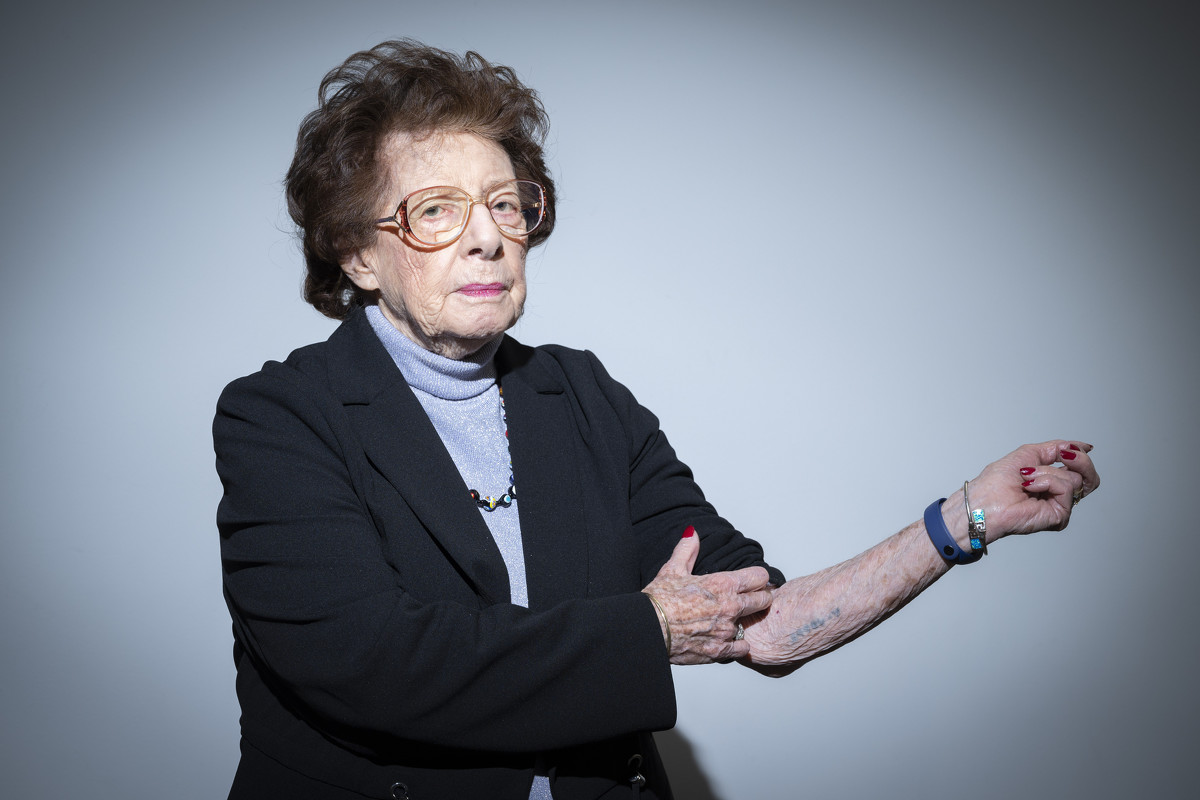
In this Thursday, Jan. 16, 2020 photo Auschwitz survivor Agi Geva poses for a photo showing her identification number tattooed on her arm at the United States Holocaust Memorial Museum, in Washington. Ahead of commemorations marking the 75th anniversary of the liberation of Auschwitz by the Soviet army, Associated Press reporters and photographers visited survivors in Germany, Poland, Sweden, Russia, the United States and Israel. Many posed showing the blue tattoos still imprinted on their arms, lifelong testaments of their suffering and loss. (AP Photo/Kevin Wolf)
Seventy-five years after the killing stopped at Auschwitz, the survivors still bear witness, and many observe the rising hatred and anti-Semitism in the world today with a sense of deep disquiet.
Ahead of commemorations marking the 75th anniversary of the liberation of Auschwitz by the Soviet army, Associated Press reporters and photographers visited survivors in Germany, Poland, Sweden, Russia, the United States and Israel. Many posed showing the blue tattoos still imprinted on their arms, lifelong testaments of their suffering and loss - one of many ways they continue to warn new generations.
Today, the survivors are mostly in their 80s and 90s. The youngest was only two when the camp was liberated: Eva Umlauf is 77-years-old and still a practicing psychotherapist in Munich. She will be among hundreds traveling from countries around the globe where they settled after surviving the Holocaust to attend the ceremony at Auschwitz next Monday, exactly 75 years after the Jan. 27, 1945, liberation, though some are too frail to leave their homes to attend.
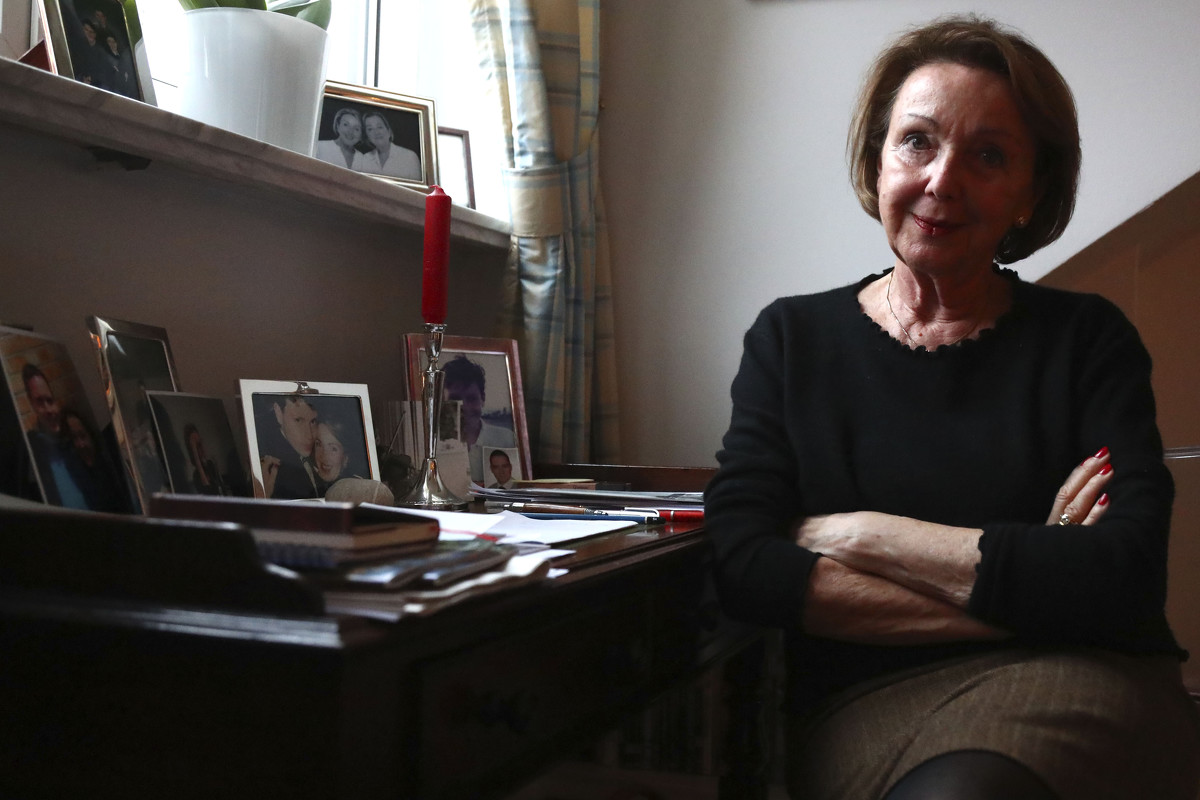
Eva Umlauf poses for a photo in Munich, Germany, Wednesday, Jan. 8, 2020. Umlauf was only two years old when she was liberated from Auschwitz. She does not have any conscious memories from her early childhood in the Nazi death camp, but even so the nightmarish experience has cast a dark shadow over her entire life. (AP Photo/Matthias Schrader)
Auschwitz was the most notorious in a system of concentration and extermination camps that Nazi Germany built across Europe. It was operated in occupied Poland, home to Europe's largest Jewish population, and at the heart of a railway network that allowed the Nazis to easily transport Jews there from elsewhere across the continent.
The old and infirm were quickly shuttled to their death, often through the iconic watchtower entrance to Birkenau, while those still deemed well enough to serve the Nazi war machine were shepherded through the pathway where the cynical "Arbeit Macht Frei" sign was placed, promising that "work sets you free."
It didn't. They were tattooed, hosed down, sheared of their hair and put to slave labor. Provided little clothing or food, they were rammed into cramped barracks locked in behind barbed wire fences. Most withered away before ending up in the crematoria or marched off to their deaths elsewhere as the allies closed in and liberated the camp on Jan. 27, 1945, a date the United Nations has since acknowledged as International Holocaust Remembrance Day.
In all, the Nazi German forces killed 1.1 million people at Auschwitz, most of them Jews, in a meticulous German effort to rid Europe of its Jews in a plan dubbed the "Final Solution."
Overall, the Holocaust claimed 6 million Jewish lives, wiping out a third of world Jewry.
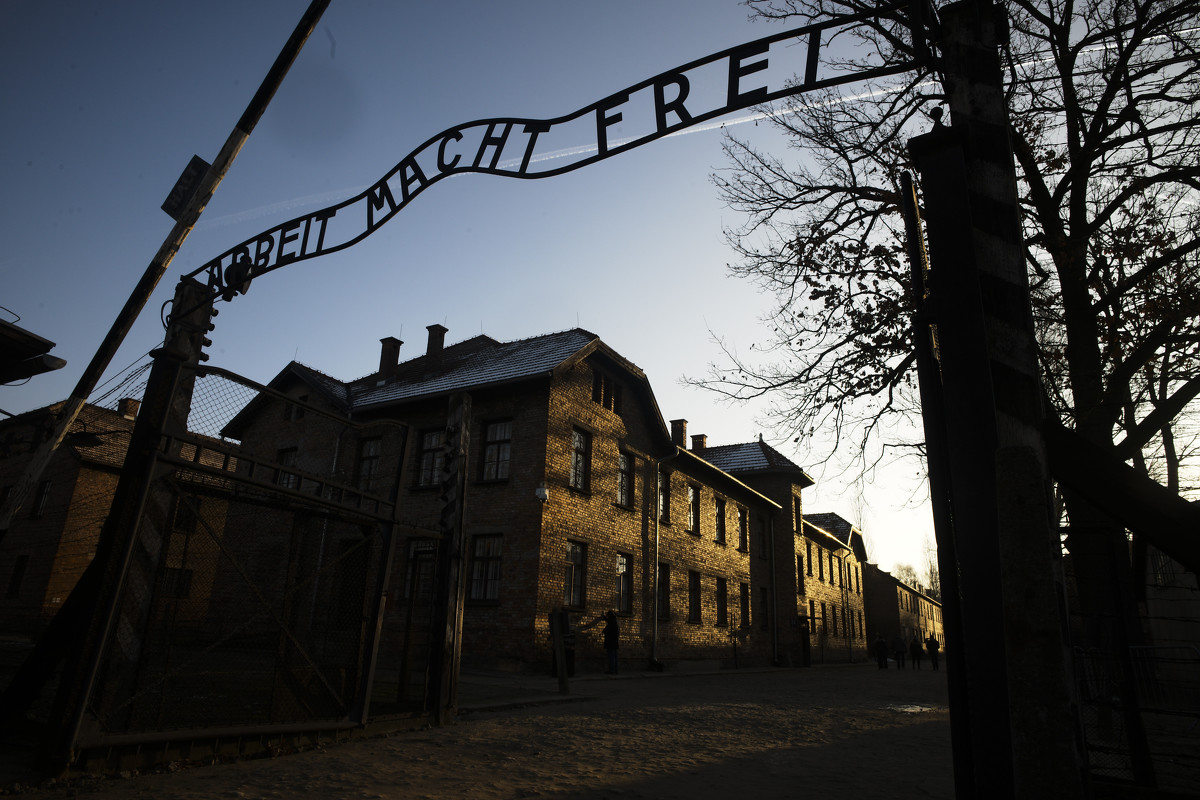
In this Dec. 6, 2019, file photo, the sun lights the buildings behind the entrance of the former Nazi death camp of Auschwitz-Birkenau in Oswiecim, Germany. World leaders will gather twice to mark the 75th anniversary of the liberation of the Auschwitz-Birkenau concentration camp _ once on Thursday, Jan. 23, 2020, in Jerusalem and again on Jan. 27 at the Auschwitz site in southern Poland. The fact that there will be two competing ceremonies reflects how politically charged World War II remains for nationalist governments in Russia and Poland. (Photo/Markus Schreiber, File)
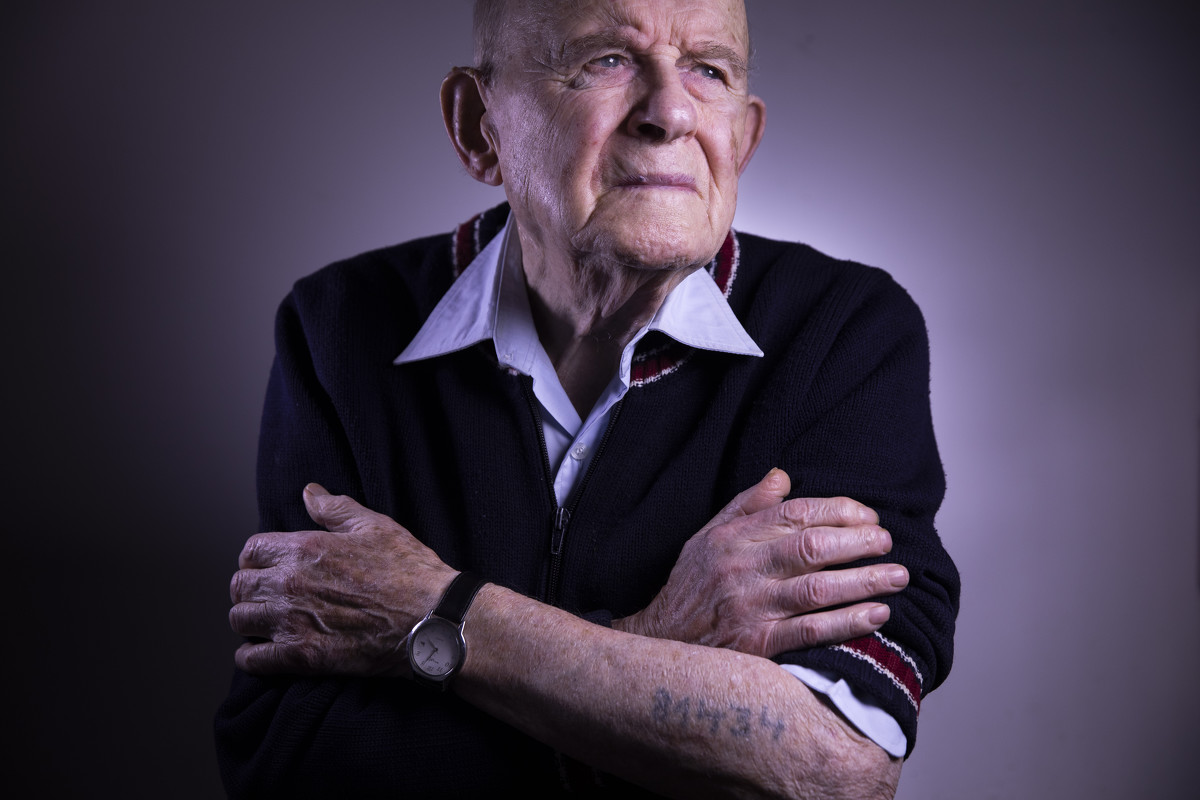
In this Thursday, Dec. 12, 2019 photo, Mordechai Ciechanower, a 95-year-old Auschwitz survivor, shows his tattooed identification number as poses for a photo at his home in Ramat Gan, Israel. His mother and two sisters were killed upon arrival in Auschwitz and he says he survived his nearly two years in the camp thanks to his roofing skills and the generous help of others. "I died hundreds of times, but kept getting up," he said. "I never thought I would get out of there, let alone live this long." The widowed Ciechanower now has six grandchildren and eight great-grandchildren. (AP Photo/Oded Balilty)
Mordechai Ciechanower, a 95-year-old Auschwitz survivor living in Ramat Gan, Israel says he survived his nearly two years in the camp thanks to his roofing skills and the generous help of others.
"I died hundreds of times, but kept getting up," he said. "I never thought I would get out of there, let alone live this long."
The widowed Ciechanower now has six grandchildren and eight great-grandchildren, and the walls of his apartment are packed with plaques acknowledging his service for leading delegations to visit former concentration camps.
He is not alone in devoting himself to Holocaust education. Many survivors still speak to young people and volunteer in Holocaust museums.
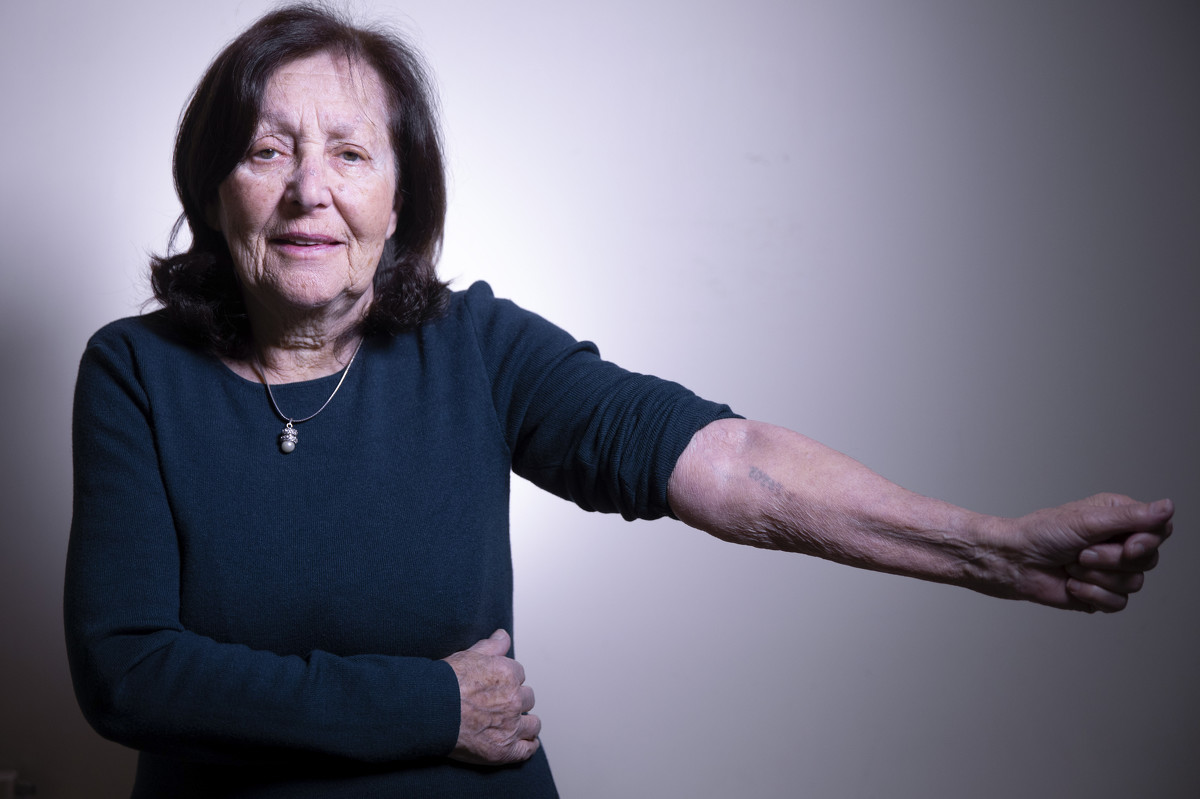
In this Tuesday, Dec. 31, 2019 photo, Marta Wise, an 85-year-old Auschwitz survivor, shows her identification number tattooed on her arm as she poses for a photo in her home in Jerusalem. As a sickly 10-year-old girl, she was one of just several thousand inmates who remained in Auschwitz on the day it was liberated by Russians soldiers after most had been marched off to die elsewhere. She now volunteers as a guide at the Yad Vashem Holocaust memorial and spends time with her 14 grandchildren and five great-grandchildren. (AP Photo/Oded Balilty)
Marta Wise, an 85-year-old Auschwitz survivor, was a sickly 10-year-old girl who was among just several thousand inmates who remained at Auschwitz on the day it was liberated after most had been marched off to die elsewhere. She now volunteers as a guide at the Yad Vashem Holocaust memorial and spends time with her 14 grandchildren and many great-grandchildren.
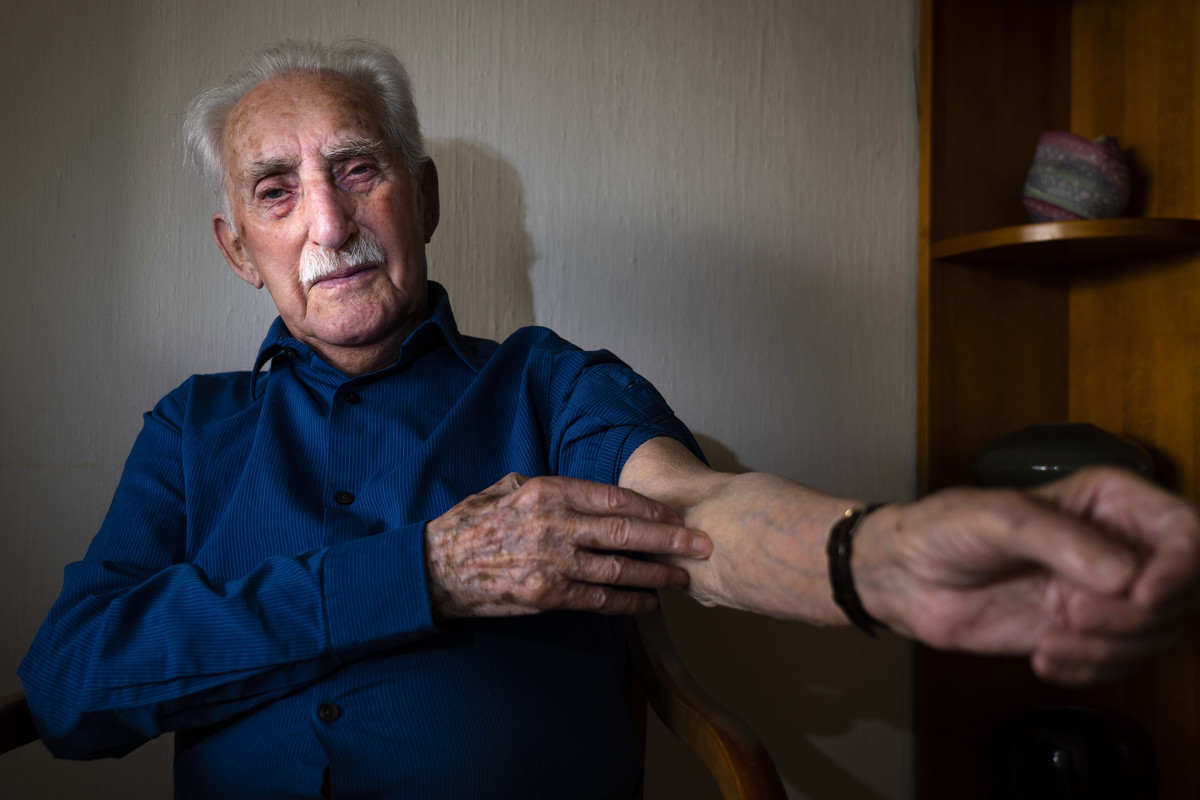
In this Friday, Jan. 10, 2020 photo Auschwitz survivor Leon Weintraub, 94, shows his arm where he has no identification number as he poses for a portrait in his apartment in Stockholm, Sweden. In 1940, his entire family was forced to live in the Lodz Ghetto from where they were deported to the Auschwitz concentration camp in 1944. Several weeks after arriving, he managed to escape by joining a group of inmates assigned to the Gross-Rosen concentration camp where he was forced to work as an electrician. To escape Auschwitz, he stripped off his prisoners' clothes to blend in to this group of naked prisoners who had just received their tattoos and were heading to pick up a new set of clothes. For this reason, he has no tattoo. He later learnt that all the other boys from his block in Auschwitz were killed in the gas chambers. (AP Photo/David Keyton)
Leon Weintraub, a 94-year-old Polish Jew, is horrified by the rising far-right extremism in his homeland, where even some small fringe neo-Nazi groups exist. "This is unbelievable that descendants of Poles killed by the Nazis call (themselves) today Nazis," he said.
Survivors are also deeply troubled to see politicians seeking to win political points with memories of the war.
A 96-year-old Polish Catholic survivor of Auschwitz and the Ravensbrueck camp, Zofia Pomysz, began to shake with rage when asked about Russian President Vladimir Putin seeking now to shift blame for the war onto Poland, which was the war's first victim. "It's despicable," she said, recalling how she and her family were fleeing the invading Germans in 1939 only to be told that Soviets had invaded from the east.
Yevgeny Kovalev, a 92-year-old Russian who was imprisoned in Auschwitz from 1943-44 for helping Soviet partisans blow up railways and trains to sabotage the Nazi invaders, recalled whippings so brutal that his shirt became drenched in blood.
"Remembering all that is always like torture for me, can you imagine that. I'm even wondering myself how I could survive those time," Kovalev said.
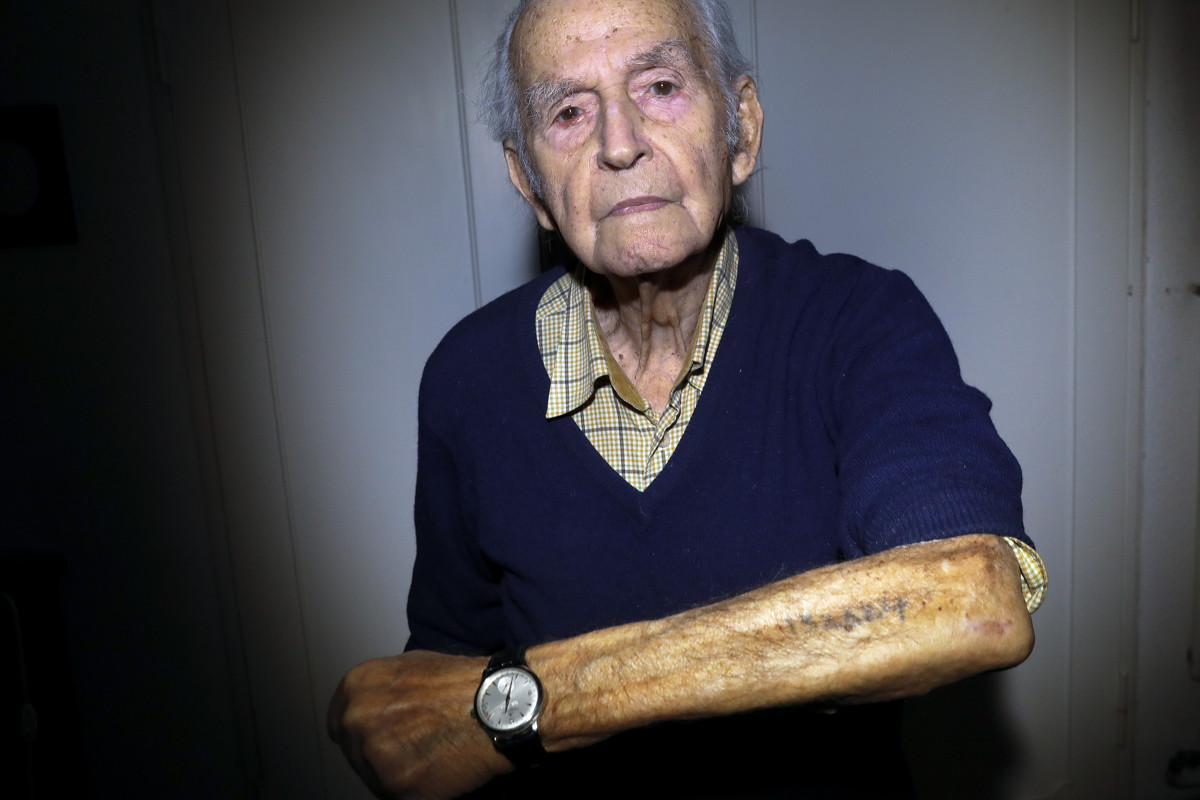
In this Saturday, Jan. 4, 2020 photo Holocaust and Auschwitz survivor Leon Schwarzbaum shows his tattooed identification number in his home in Berlin. Ahead of commemorations marking the 75th anniversary of the liberation of Auschwitz by the Soviet army, Associated Press reporters and photographers visited survivors in Germany, Poland, Sweden, Russia, the United States and Israel. Many posed showing the blue tattoos still imprinted on their arms, lifelong testaments of their suffering and loss. (AP Photo/Markus Schreiber)
At age 98, Leon Schwarzbaum, a retired art dealer, still lives on his own in his Berlin apartment, the walls covered with paintings and old back-and-white pictures of his 35 relatives who perished in the Holocaust. He said he is too frail to travel to Auschwitz, but still goes to schools in Germany regularly to tell the children about the unbearable sufferings he lived through at the death camp.
Schwarzbaum said he is deeply worried about the expanding anti-Semitism in Europe.
"If things get worse, I would not want to live through such times again," he said. "I would immigrate to Israel right away."
___
Gera reported from Warsaw and Heller from Jerusalem. David Keyton in Stockholm, Kirsten Grieshaber in Berlin, Pietro DeCristofaro in Munich, and Olga Tregubova in Moscow also contributed.
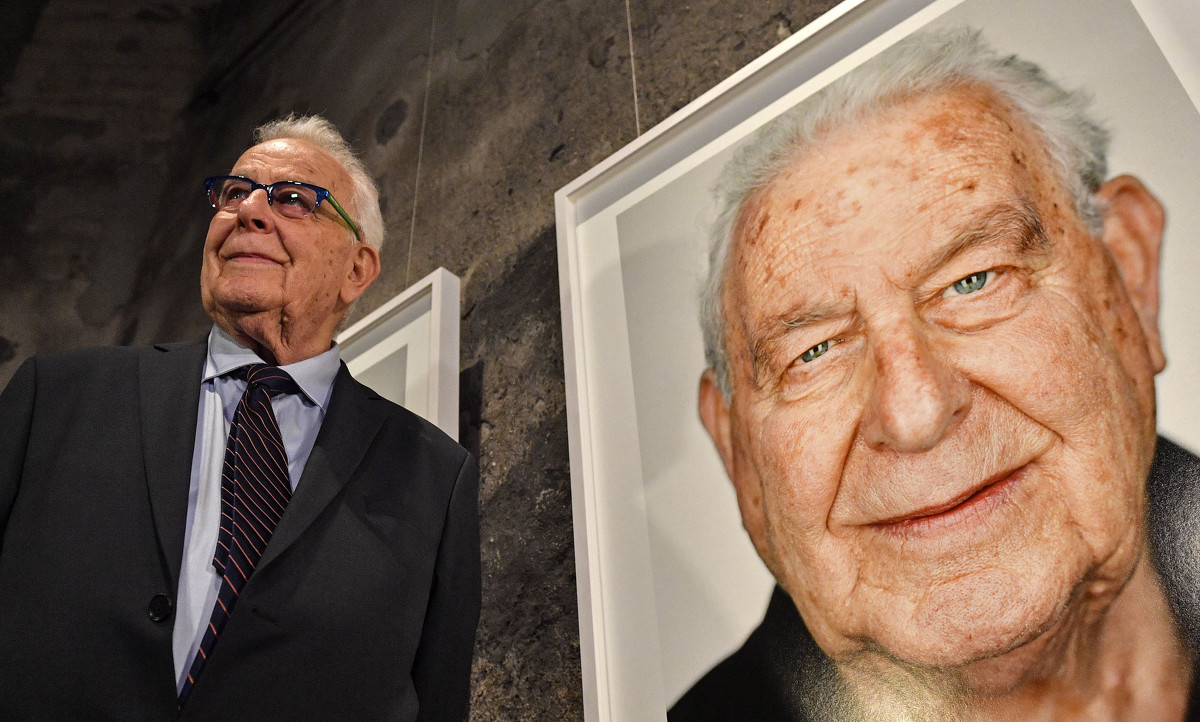
Holocaust survivor Naftali Furst stands next to his portrait during the opening of the exhibition 'Survivors - Faces of Life after the Holocaust' at the former coal mine Zollverein in Essen, Germany, Tuesday, Jan. 21, 2020. The industrial world heritage landmark Zollverein shows 75 years after the liberation of the Nazi death camp Auschwitz-Birkenau, 75 portraits of Jewish survivors, photographed in Israel by German artist Martin Schoeller. (AP Photo/Martin Meissner)
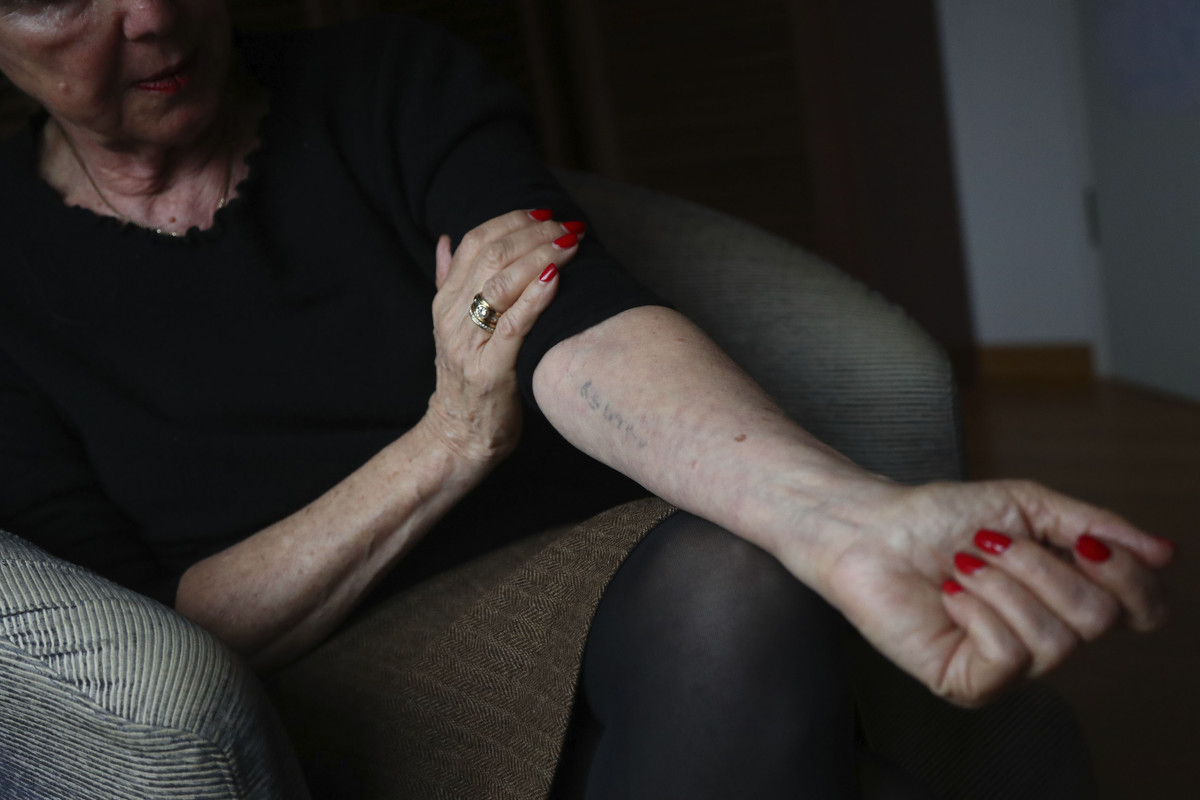
Eva Umlauf shows her tattooed number as she poses for a photo in Munich, Germany, Wednesday, Jan. 8, 2020. Umlauf was only two years old when she was liberated from Auschwitz. She does not have any conscious memories from her early childhood in the Nazi death camp, but even so the nightmarish experience has cast a dark shadow over her entire life. (AP Photo/Matthias Schrader)
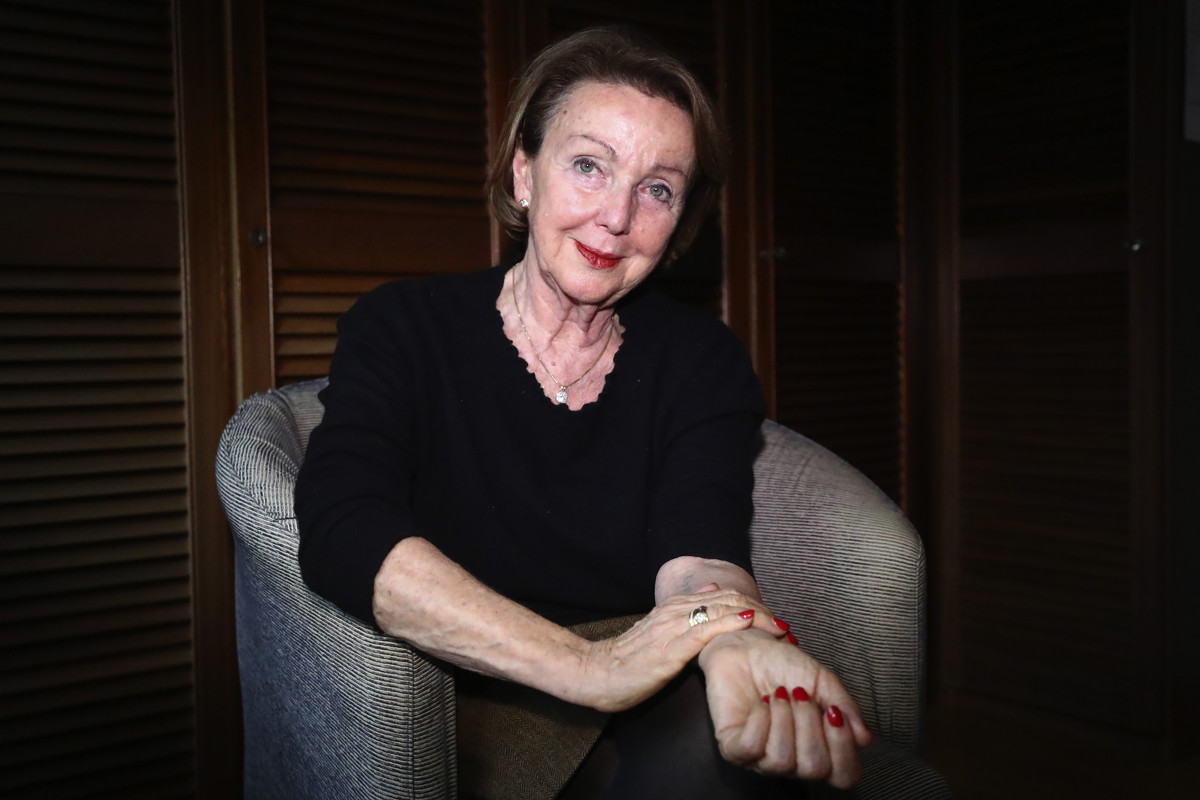
Eva Umlauf poses for a photo in Munich, Germany, Wednesday, Jan. 8, 2020. Umlauf was only two years old when she was liberated from Auschwitz. She does not have any conscious memories from her early childhood in the Nazi death camp, but even so the nightmarish experience has cast a dark shadow over her entire life. (AP Photo/Matthias Schrader)
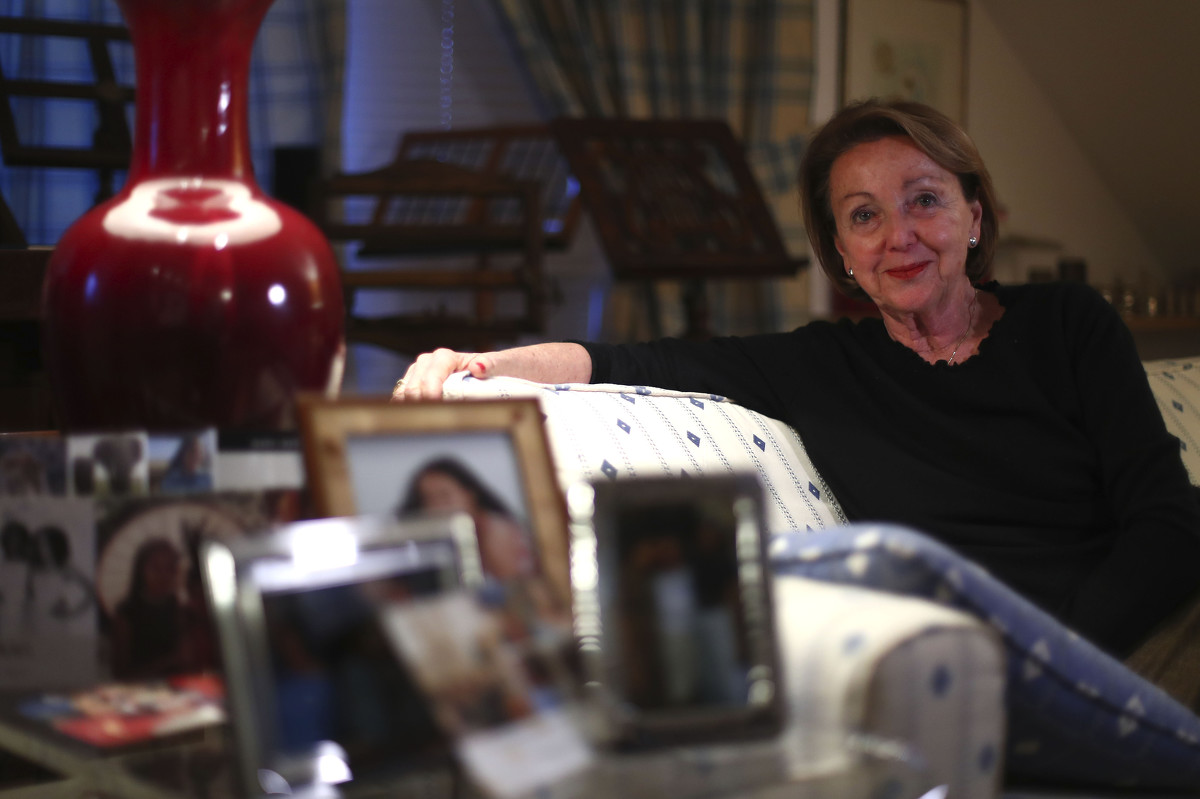
Eva Umlauf poses for a photo in Munich, Germany, Wednesday, Jan. 8, 2020. Umlauf was only two years old when she was liberated from Auschwitz. She does not have any conscious memories from her early childhood in the Nazi death camp, but even so the nightmarish experience has cast a dark shadow over her entire life. (AP Photo/Matthias Schrader)
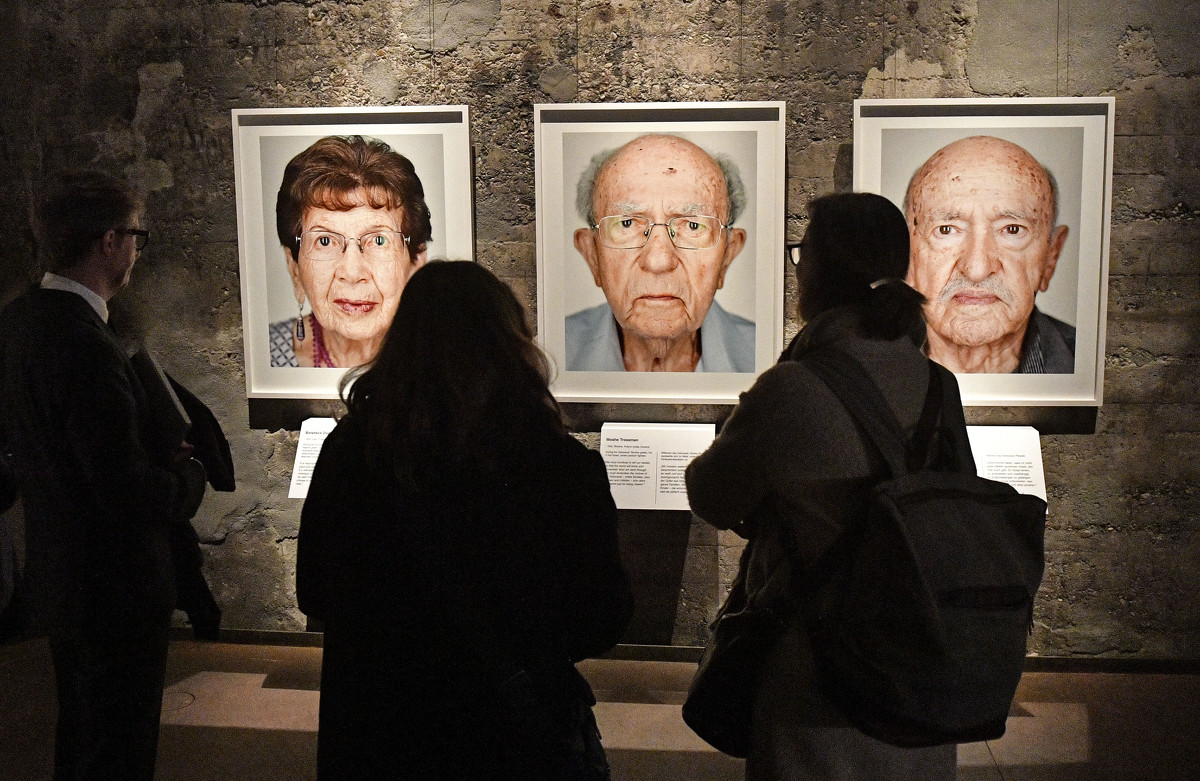
Visitors look at portrait photos of the exhibition 'Survivors - Faces of Life after the Holocaust' at the former coal mine Zollverein in Essen, Germany, Tuesday, Jan. 21, 2020. The world heritage landmark Zollverein shows 75 years after the liberation of the Nazi death camp Auschwitz-Birkenau, 75 portraits of Jewish survivors, photographed in Israel by German artist Martin Schoeller. (AP Photo/Martin Meissner)
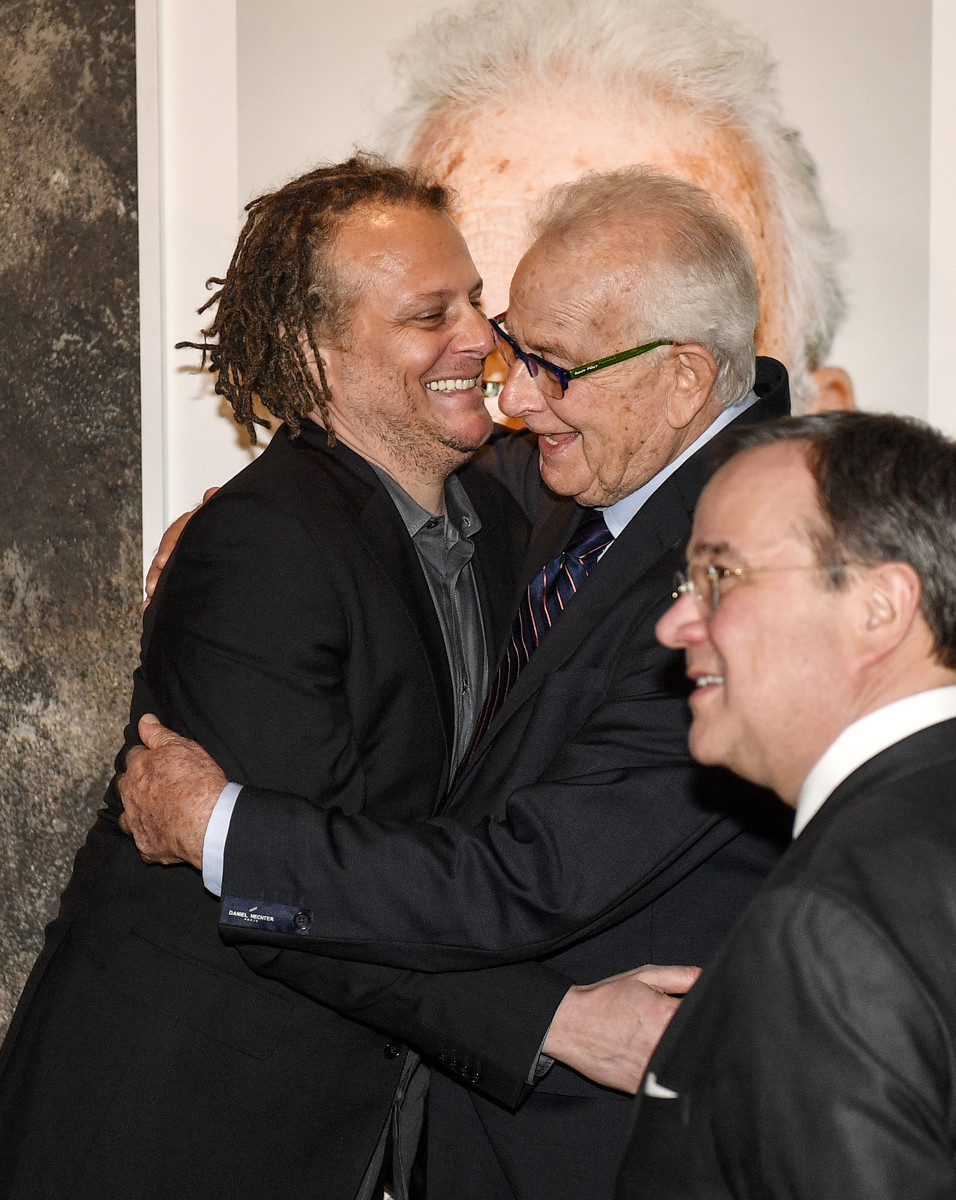
Holocaust survivor Naftali Furst, right, is embraced by photographer Martin Schoeller, left, during the opening of the exhibition 'Survivors - Faces of Life after the Holocaust' at the former coal mine Zollverein in Essen, Germany, Tuesday, Jan. 21, 2020. The industrial world heritage landmark Zollverein shows 75 years after the liberation of the Nazi death camp Auschwitz-Birkenau, 75 portraits of Jewish survivors, photographed in Israel by German artist Martin Schoeller. (AP Photo/Martin Meissner)
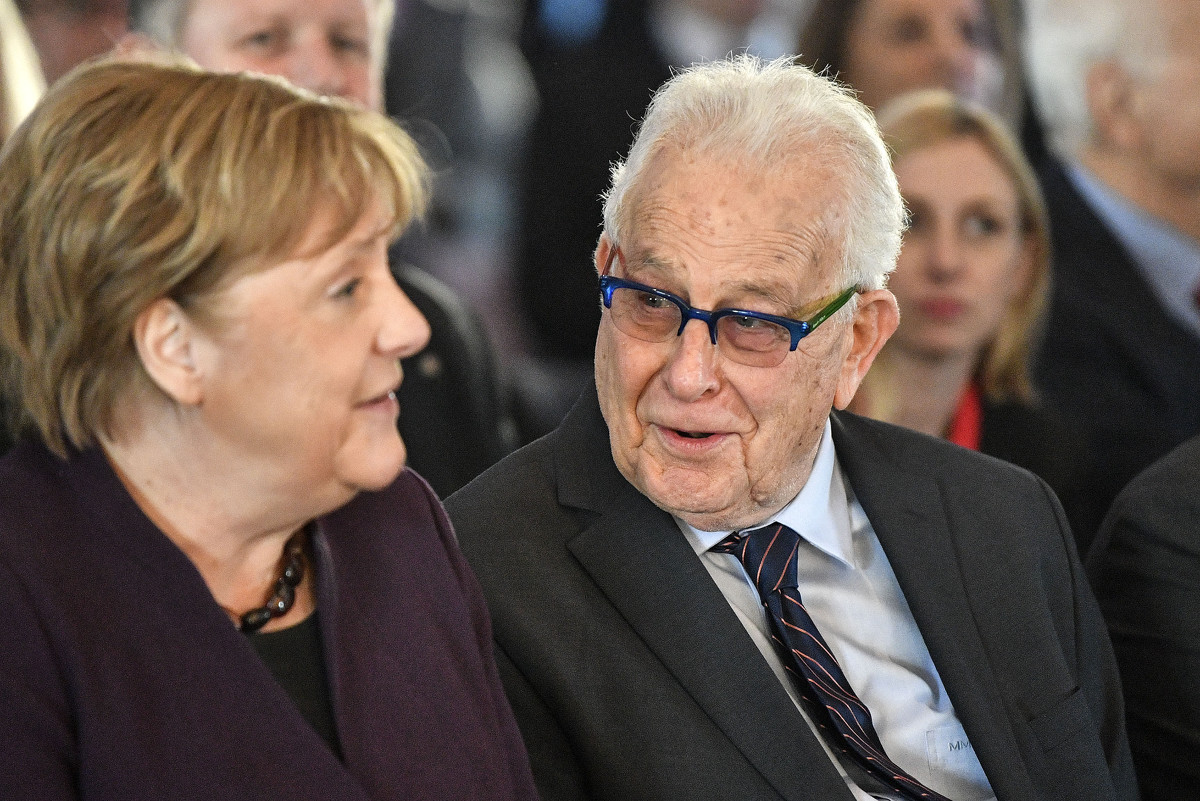
German chancellor Angela Merkel sits beside Holocaust survivor Naftali Furst, right, during the opening of the exhibition 'Survivors - Faces of Life after the Holocaust' at the former coal mine Zollverein in Essen, Germany, Tuesday, Jan. 21, 2020. The industrial world heritage landmark Zollverein shows 75 years after the liberation of the Nazi death camp Auschwitz-Birkenau, 75 portraits of Jewish survivors, photographed in Israel by German artist Martin Schoeller. (AP Photo/Martin Meissner)
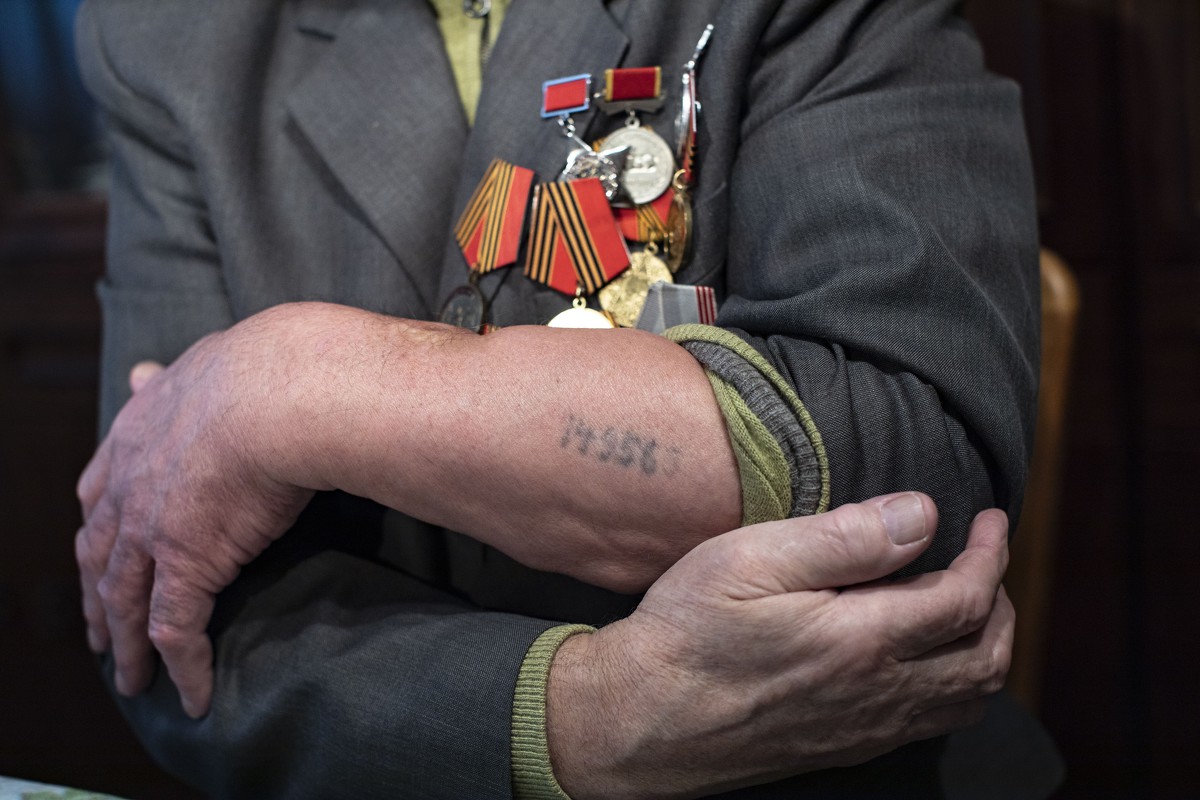
In this photo taken on Monday, Jan. 20, 2020, Yevgeny Kovalyov, 92, one of the Auschwitz concentration camp's survivors, shows the camp's identification number tattooed on his arm during an interview with the Associated Press at his flat in Moscow, Russia. Kovalyov was sent to Auschwitz in 1943. (AP Photo/Alexander Zemlianichenko)
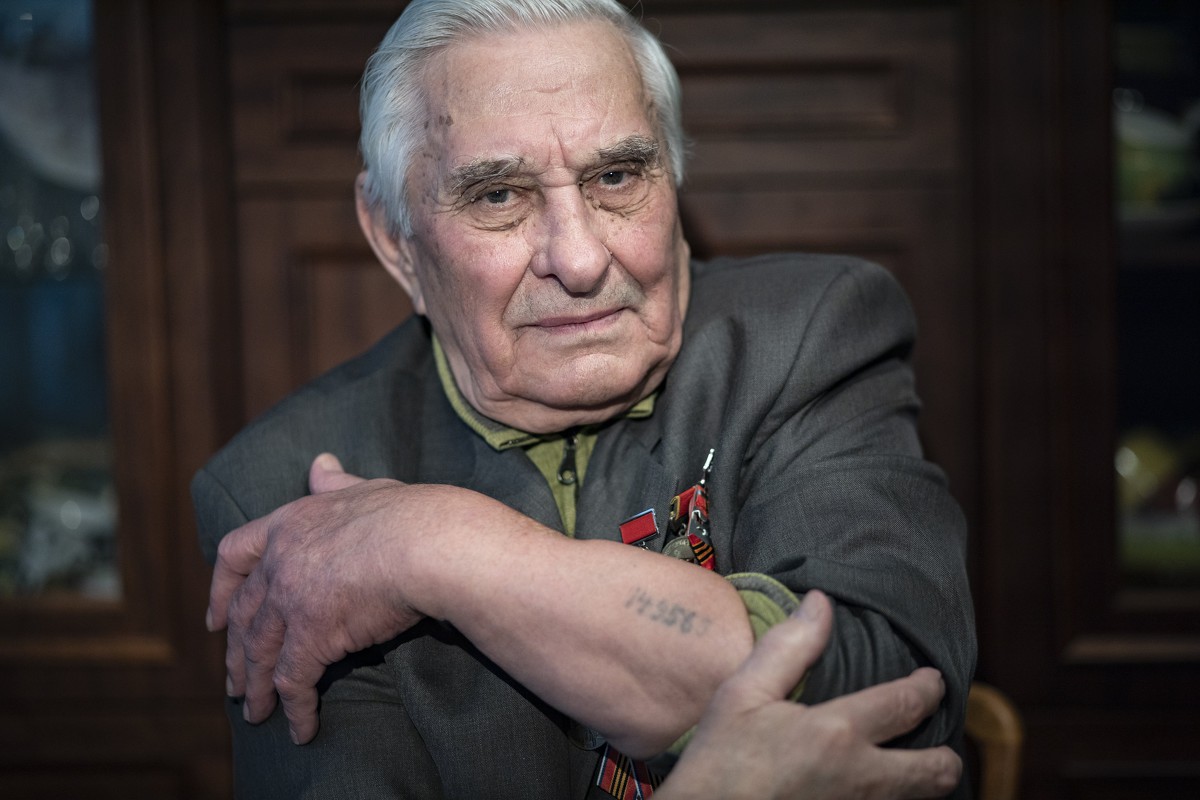
In this photo taken on Monday, Jan. 20, 2020, Yevgeny Kovalyov, 92, one of the Auschwitz concentration camp's survivors, shows the camp's identification number tattooed on his arm during an interview with the Associated Press at his flat in Moscow, Russia. Kovalyov was sent to Auschwitz in 1943. (AP Photo/Alexander Zemlianichenko)
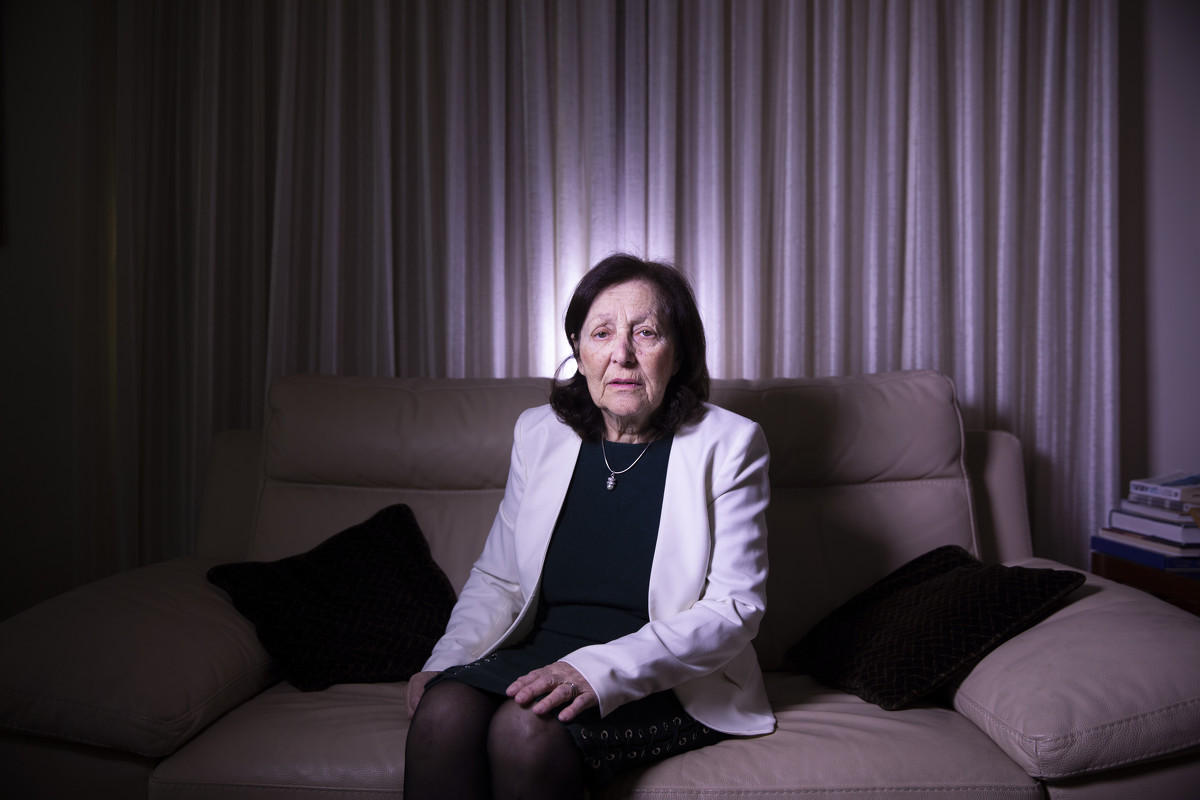
In this Tuesday, Dec. 31, 2019 photo, Marta Wise, an 85-year-old Auschwitz survivor, poses for a photo in her home in Jerusalem. As a sickly 10-year-old girl, she was one of just several thousand inmates who remained in Auschwitz on the day it was liberated by Russians soldiers after most had been marched off to die elsewhere. She now volunteers as a guide at the Yad Vashem Holocaust memorial and spends time with her 14 grandchildren and five great-grandchildren. (AP Photo/Oded Balilty)
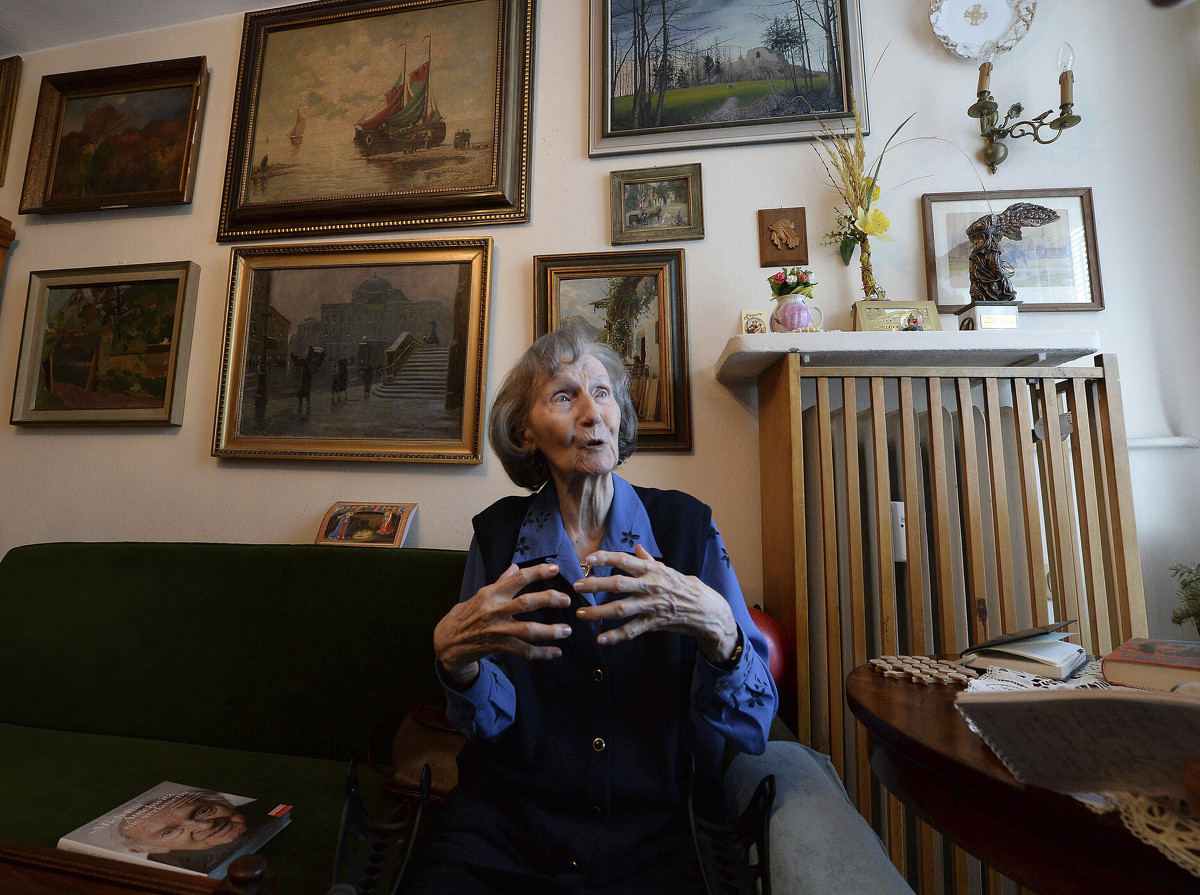
In this Tuesday, Jan. 14, 2020 photo Zofia Posmysz, a 96-year-old Polish Catholic woman who survived the Nazi German concentration camps of Auschwitz and Ravensbrueck, poses at her home in Warsaw, Poland. Ahead of commemorations marking the 75th anniversary of the liberation of Auschwitz by the Soviet army, Associated Press reporters and photographers visited survivors in Germany, Poland, Sweden, Russia, the United States and Israel. Many posed showing the blue tattoos still imprinted on their arms, lifelong testaments of their suffering and loss. (AP Photo/Czarek Sokolowski)
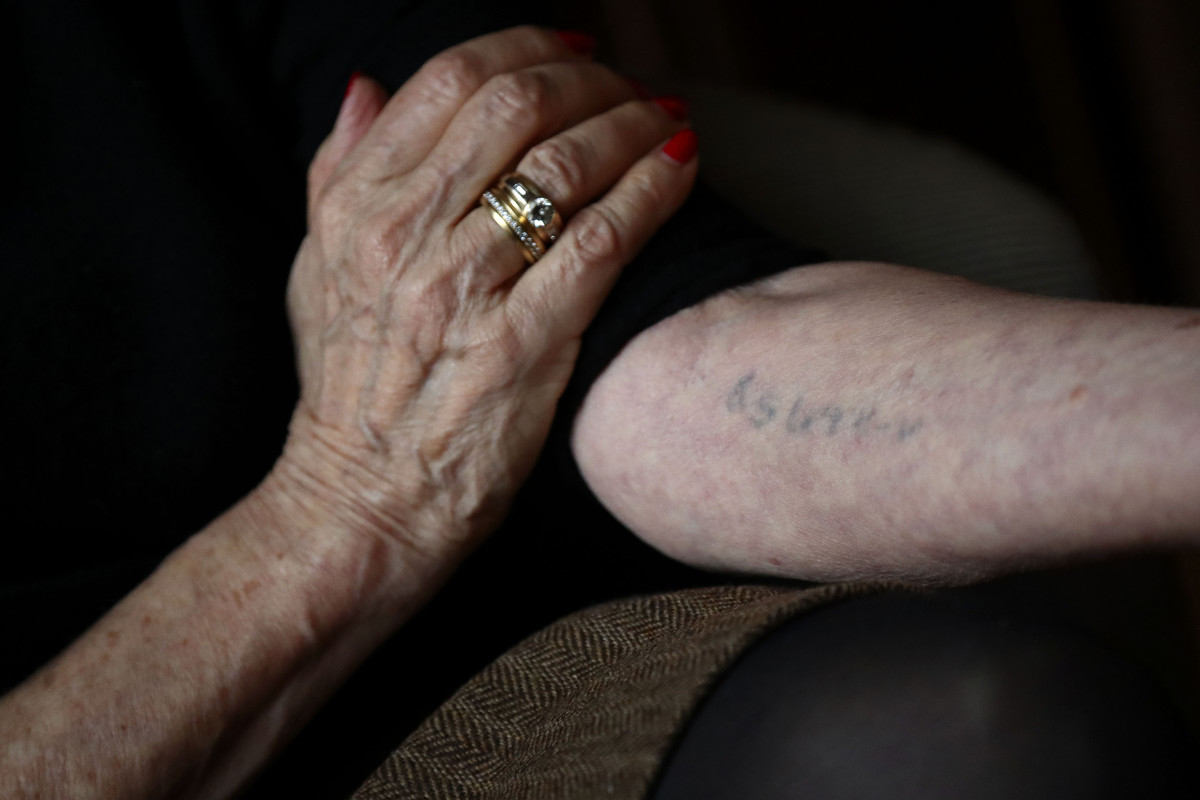
In this Wednesday, Jan. 8, 2020 photo Auschwitz survivor Eva Umlauf shows her tattoed arm as she poses for a photo in Munich, Germany. Ahead of commemorations marking the 75th anniversary of the liberation of Auschwitz by the Soviet army, Associated Press reporters and photographers visited survivors in Germany, Poland, Sweden, Russia, the United States and Israel. Many posed showing the blue tattoos still imprinted on their arms, lifelong testaments of their suffering and loss. (AP Photo/Matthias Schrader)
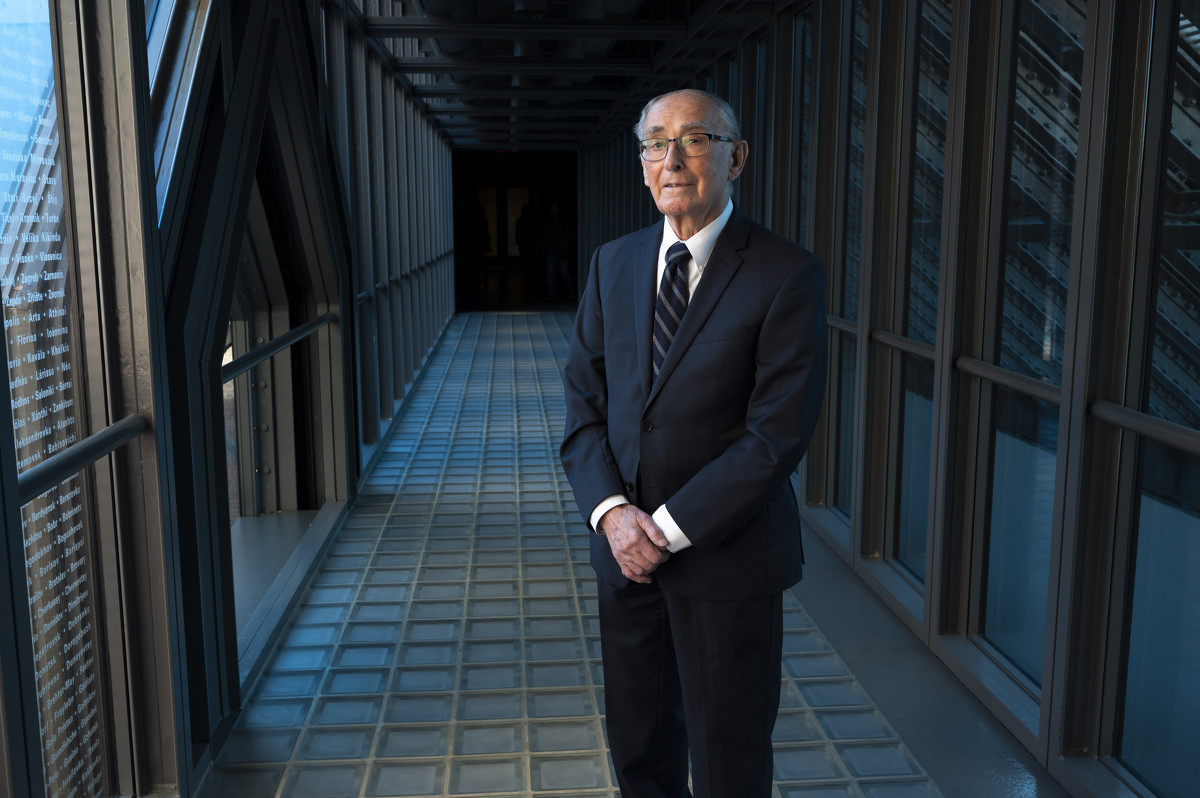
In this Friday, Jan. 17, 2020 photo Auschwitz survivor Marty Weiss poses for a photo at the United States Holocaust Memorial Museum in Washington. (AP Photo/Kevin Wolf)
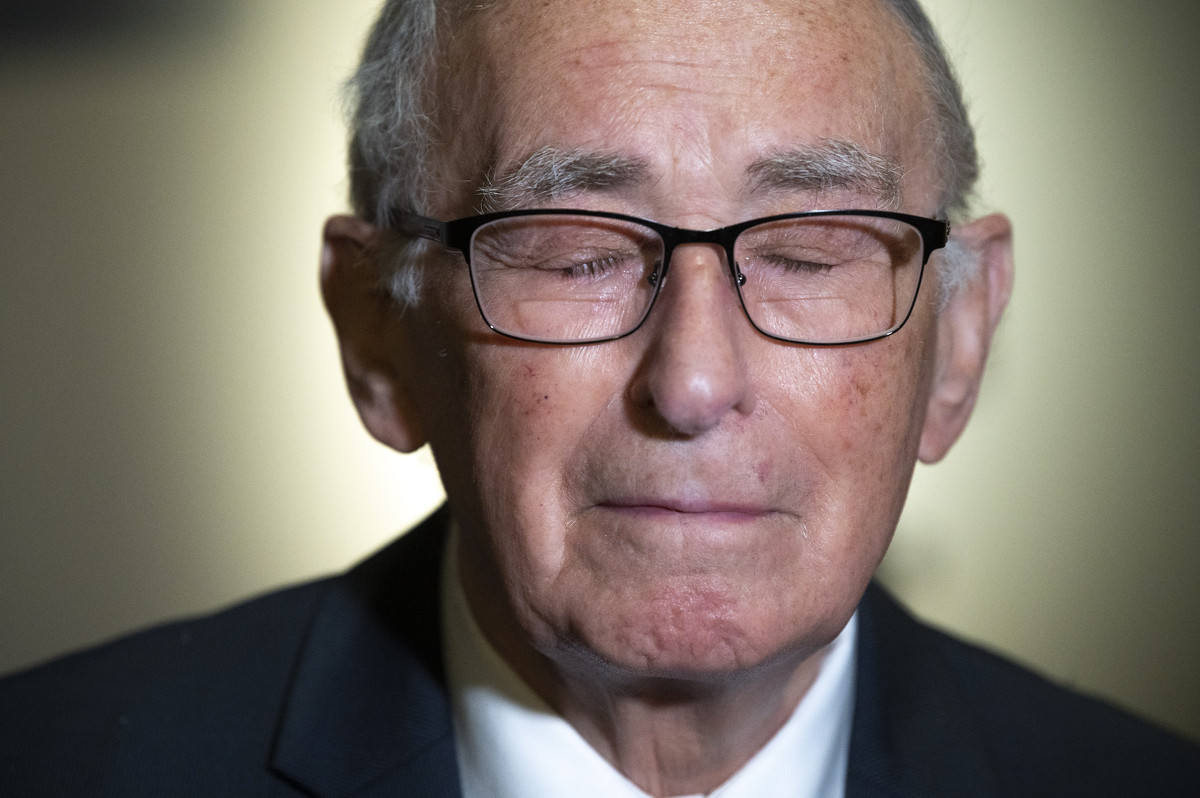
In this Friday, Jan. 17, 2020 photo Auschwitz survivor Marty Weiss poses for a photo at the United States Holocaust Memorial Museum in Washington. (AP Photo/Kevin Wolf)
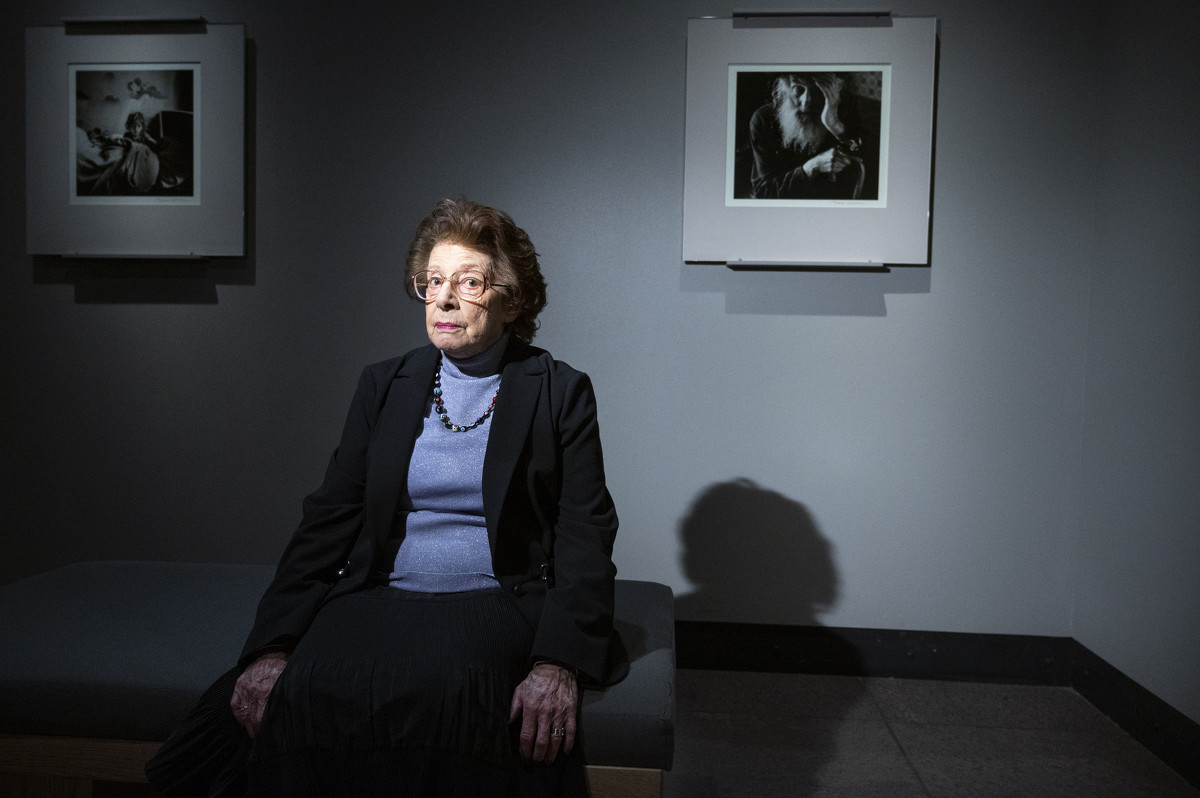
In this hursday, Jan. 16, 2020 photo Auschwitz survivor Agi Geva poses for a photo at the United States Holocaust Memorial Museum in Washington. Ahead of commemorations marking the 75th anniversary of the liberation of Auschwitz by the Soviet army, Associated Press reporters and photographers visited survivors in Germany, Poland, Sweden, Russia, the United States and Israel. Many posed showing the blue tattoos still imprinted on their arms, lifelong testaments of their suffering and loss. (AP Photo/Kevin Wolf)
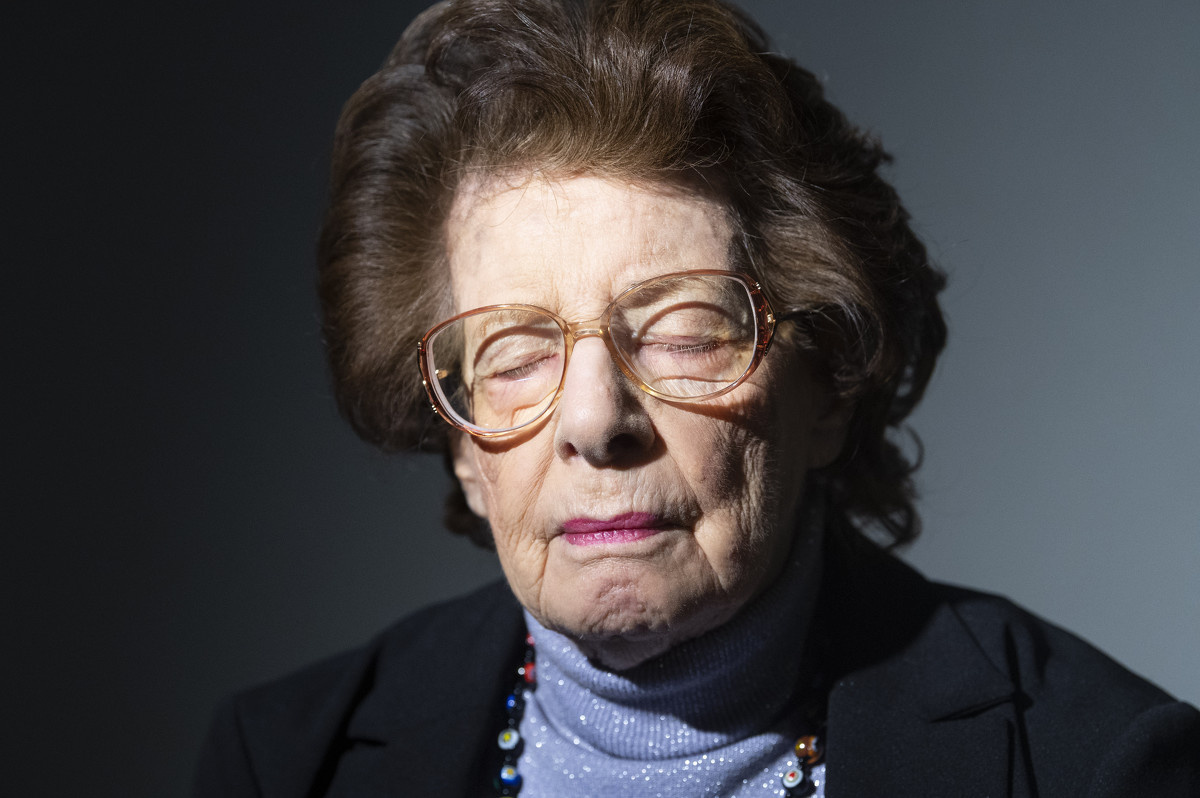
In this hursday, Jan. 16, 2020 photo Auschwitz survivor Agi Geva poses for a photo at the United States Holocaust Memorial Museum in Washington. Ahead of commemorations marking the 75th anniversary of the liberation of Auschwitz by the Soviet army, Associated Press reporters and photographers visited survivors in Germany, Poland, Sweden, Russia, the United States and Israel. Many posed showing the blue tattoos still imprinted on their arms, lifelong testaments of their suffering and loss. (AP Photo/Kevin Wolf)
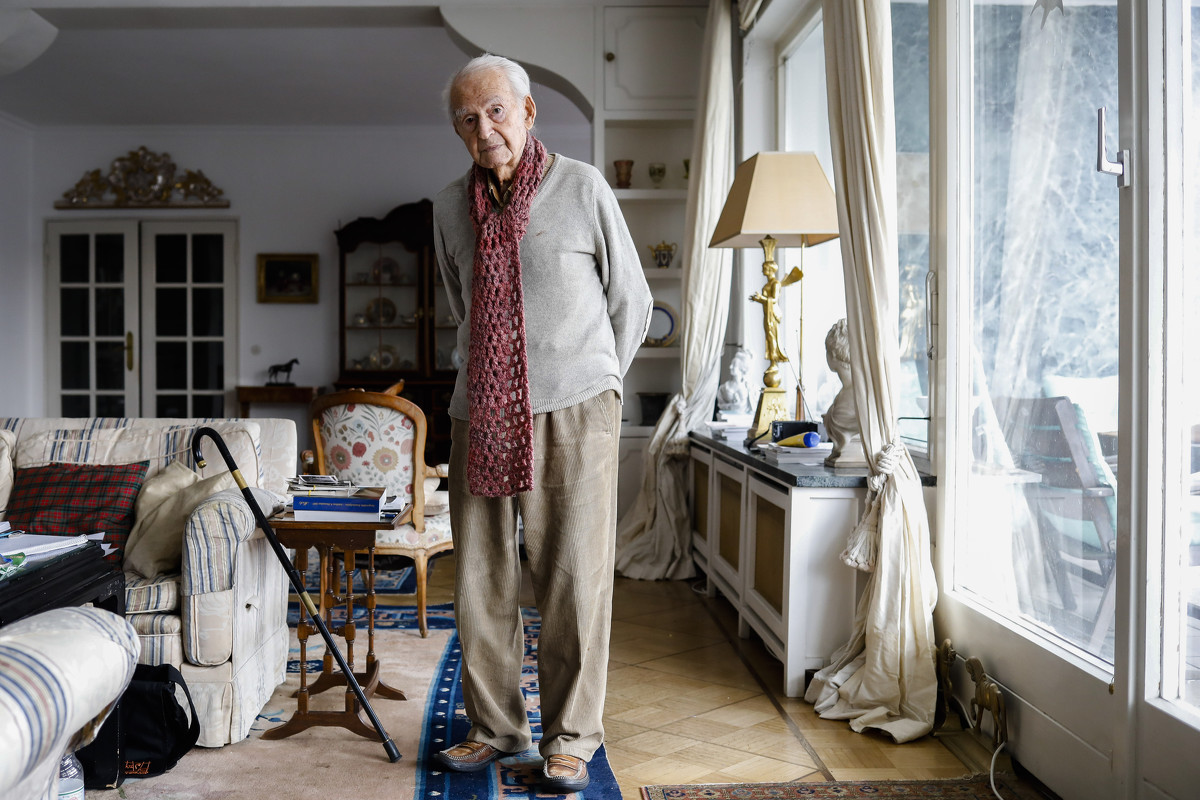
In this Dec. 12, 2019 photo Holocaust and Auschwitz survivor Leon Schwarzbaum poses for a photo in his home during an interview with the Associated Press in Berlin. (AP Photo/Markus Schreiber)
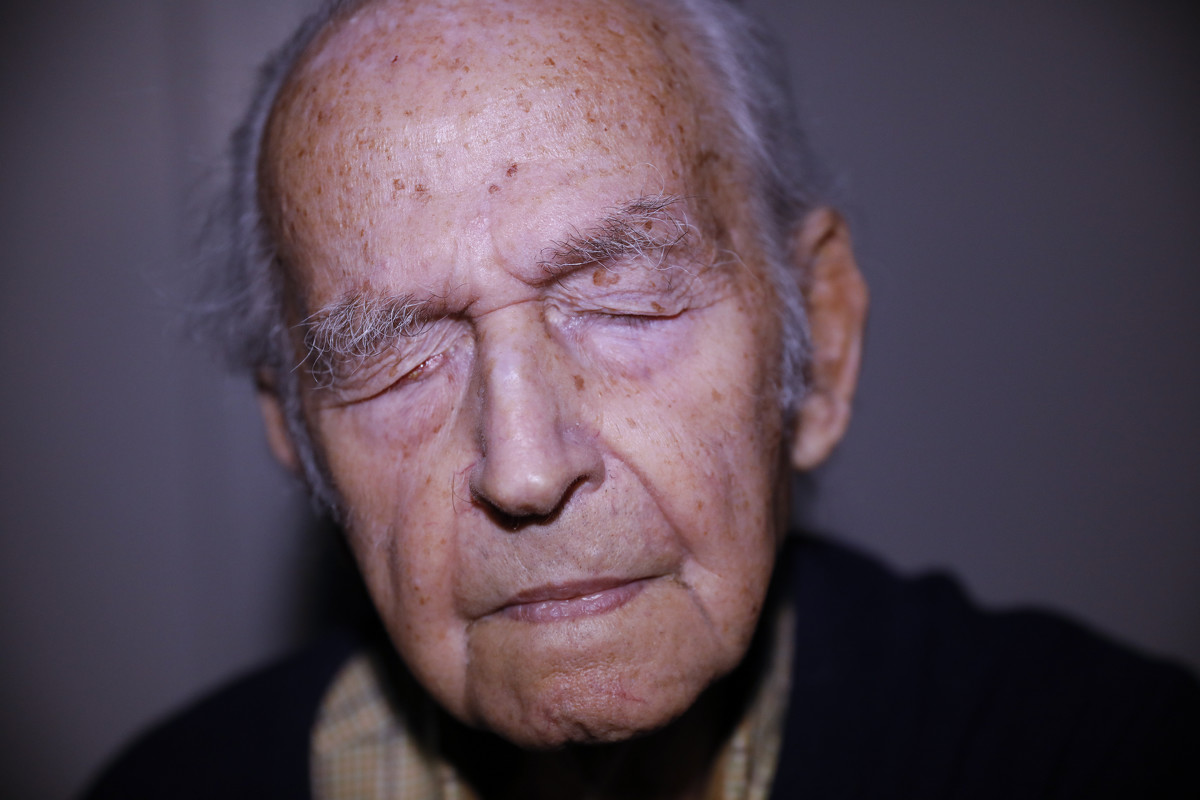
In this Saturday, Jan. 4, 2020 photo Holocaust and Auschwitz survivor Leon Schwarzbaum poses for a portrait in his home in Berlin during an interview with the Associated Press. Ahead of commemorations marking the 75th anniversary of the liberation of Auschwitz by the Soviet army, Associated Press reporters and photographers visited survivors in Germany, Poland, Sweden, Russia, the United States and Israel. Many posed showing the blue tattoos still imprinted on their arms, lifelong testaments of their suffering and loss. (AP Photo/Markus Schreiber)
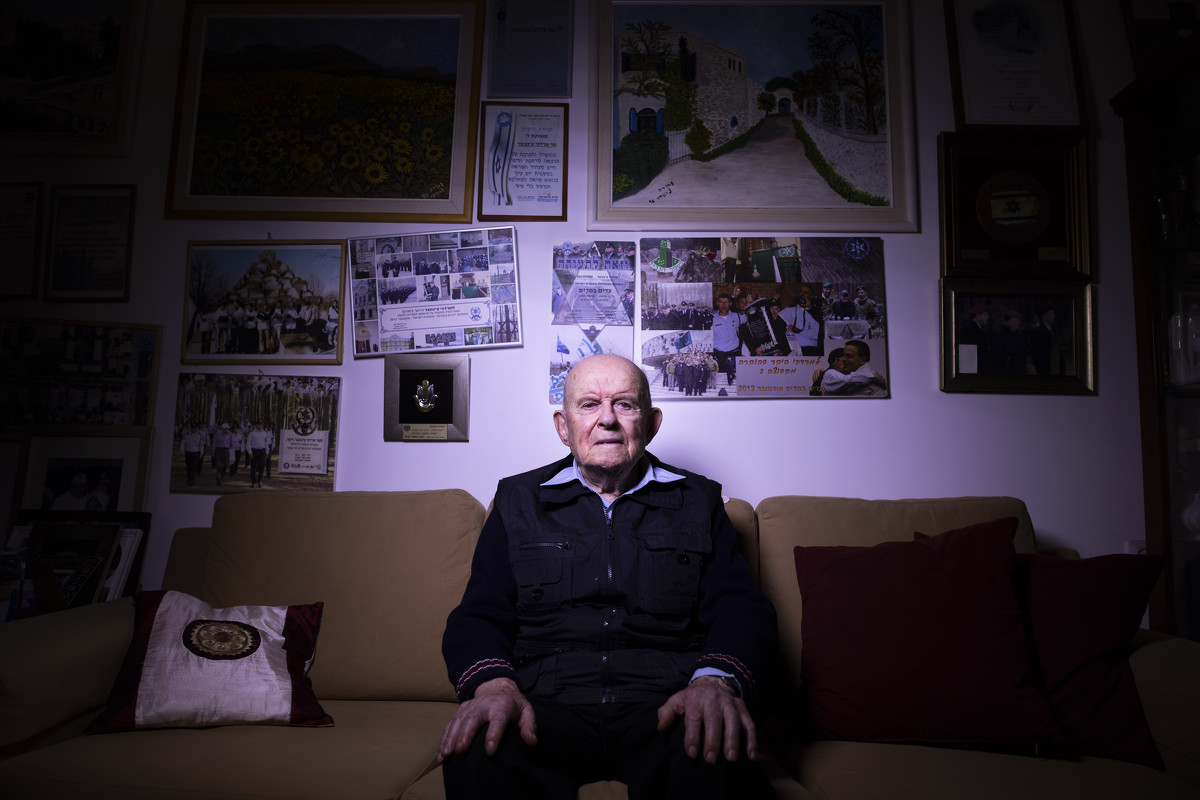
In this Thursday, Dec. 12, 2019 photo, Mordechai Ciechanower, a 95-year-old Auschwitz survivor, poses for a photo in his home in Ramat Gan, Israel. His mother and two sisters were killed upon arrival in Auschwitz and he says he survived his nearly two years in the camp thanks to his roofing skills and the generous help of others. "I died hundreds of times, but kept getting up," he said. "I never thought I would get out of there, let alone live this long." The widowed Ciechanower now has six grandchildren and eight great-grandchildren. (AP Photo/Oded Balilty)
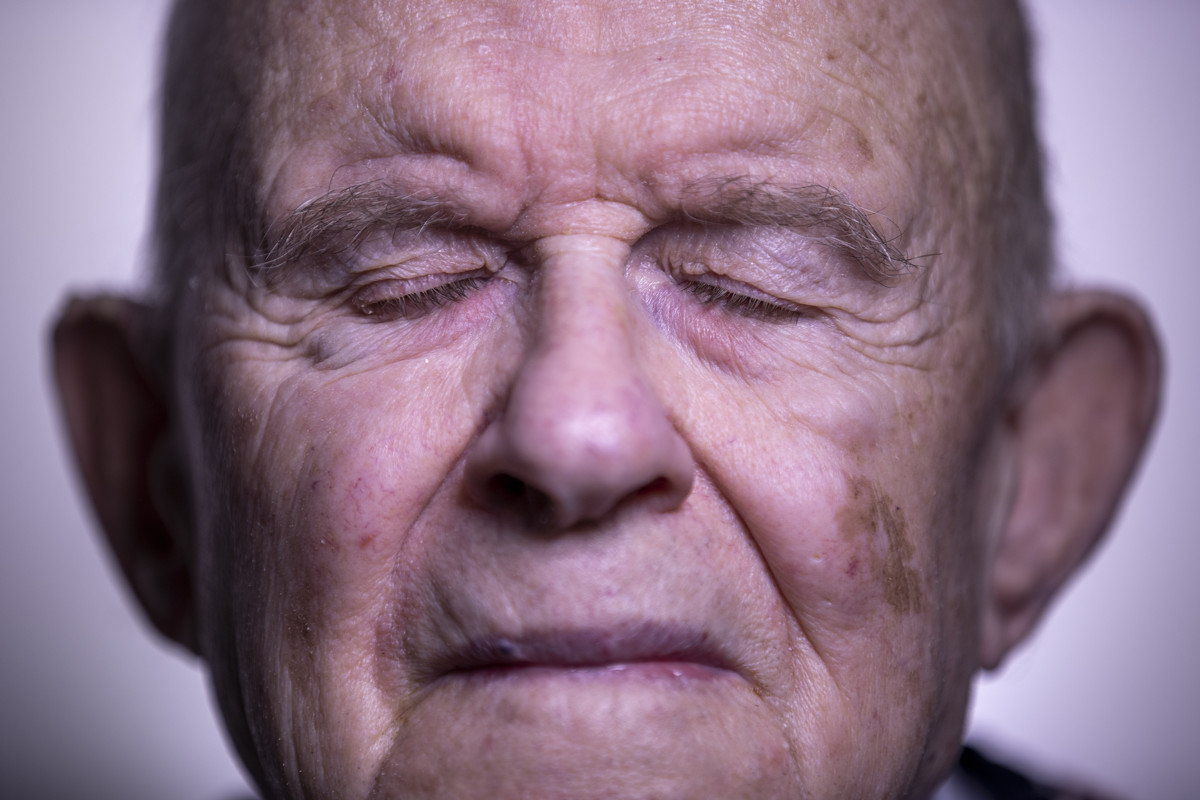
In this Thursday, Dec. 12, 2019 photo, Mordechai Ciechanower, a 95-year-old Auschwitz survivor, poses for a photo in his home in Ramat Gan, Israel. His mother and two sisters were killed upon arrival in Auschwitz and he says he survived his nearly two years in the camp thanks to his roofing skills and the generous help of others. "I died hundreds of times, but kept getting up," he said. "I never thought I would get out of there, let alone live this long." The widowed Ciechanower now has six grandchildren and eight great-grandchildren. (AP Photo/Oded Balilty)